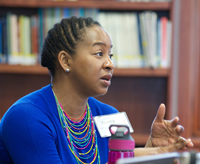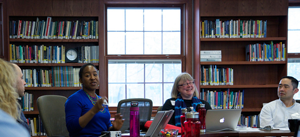I am organized.
I have to-do lists, stop-doing lists, someday lists, and checklists galore. When it’s time to prep for the semester, I pull up my teaching Excel spreadsheet and get to work. Order books. Revise syllabus. Set up BlackBoard. And request to be assigned to my favorite sunny classroom.
I had my lecture ready for the first day of my Introduction to Old Testament/Hebrew Bible class. It is a combination of welcome, syllabus review, and class overview while channeling Lou Gossett, Jr. in An Officer and a Gentleman.
But when the news broke regarding Ferguson, I had to reconsider.
On August 9th in Ferguson, Missouri, a White police officer, Darren Wilson, shot and killed an unarmed Black man, 18-year-old Michael Brown. As the news went viral, many of my academic colleagues on social media offered their thoughts and feelings about yet another instance of police brutality against African Americans. Marcia Chatelain began tweeting teaching resources with the hashtag #FergusonSyllabus (link: https://twitter.com/hashtag/FergusonSyllabus), and some colleagues expressed their intention to discuss issues related to Ferguson on the first day of class.
Yet, I noted that my non-Black colleagues tended to not say much if anything about Ferguson. Of course, I follow only a limited number of academics on social media, and I am generalizing based on my own curated networks. Still, I asked others to point me to blog posts and articles, and I heard crickets. Odyssey Network’s “On Scripture” offered preaching reflections (link: No Longer Available) several days after the initial incident. Later, G. Brooke Lester tweeted his post for the “white, patched-elbow, #sbl academic” (link: https://twitter.com/AnummaBrooke/status/502455625486700545).
I wondered if some academics regarded Ferguson as a “Black” issue and they were afraid to address issues of race. Or perhaps they regarded the events in Ferguson as unrelated to their academic fields and unconnected to their course material.
So I had to ask myself: Should I discuss Ferguson in class? On the first day of class? I could certainly see connections that I could make with Ferguson: issues of power and privilege, the treatment of the oppressed, cities of refuge…but these were connections that I could make given my knowledge of biblical texts.
After serious consideration, I chose not to address Ferguson in my class primarily because I try to teach my students to resist the too-easy attempts to read biblical texts in light of contemporary events. Many of my first-year M.Div. students are used to asking “How does this preach?” or “How does this apply to me?” I help them to learn more about the literary and historical contexts of biblical texts and the great cultural gap between ancient societies and our lives in 2014. I wanted to begin the semester by setting the foundation for the new approaches that they would discover in class. Discussing Ferguson would have taken us too far afield on the first day.
As well, I teach biblical studies at Howard University School of Divinity, and the Ferguson incident has received significant attention on campus. A picture of Howard students with their hands up in support of Mike Brown went viral (link: https://twitter.com/The_Blackness48/status/499714499688300545), and Howard alumna Mya Aaten-White was shot during Ferguson protests (link: http://www.nbcwashington.com/news/local/Howard-University-Grad-Mya-White-Shot-in-Ferguson-Missouri-271285081.html). Several official and unofficial events were taking place on campus in support of Mike Brown and Ferguson.So I felt that it was more important to offer a space that was a Ferguson-free zone.
So I’m wondering, did YOU discuss Ferguson on your first day of class? Why or why not?
About Nyasha Junior
Dr. Nyasha Junior is Associate Professor in the Department of Religion at Temple University in Philadelphia. She holds a Ph.D. in biblical studies from Princeton Theological Seminary. She writes, teaches, speaks, and frequently tweets on race, gender, religion, and their intersections. She is the author of An Introduction to Womanist Biblical Interpretation (Westminster John Knox Press, 2015). Her current projects include Reimagining Hagar: Blackness and Bible (Oxford University Press) and Black Samson: The Untold Story of an American Icon (Oxford University Press). Her public scholarship has appeared in The Washington Post, Inside Higher Ed, Buzzfeed, and other media outlets. She is passionate about grits, Star Trek, and Octavia Butler. Visit nyashajunior.com and follow her on Twitter (@NyashaJunior).

